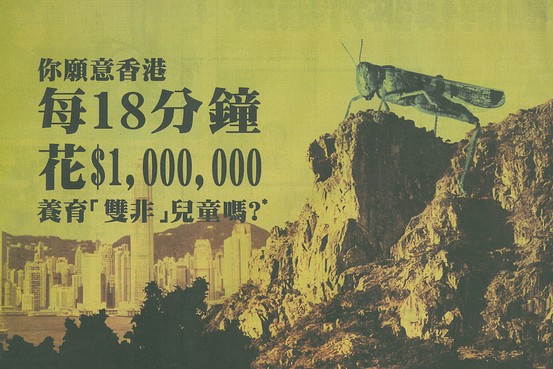
The following article is based on a talk given by Alliance Against Displacement member listen chen at the “All Investment is Global: A public panel on the foreign investment myth” held at Burnaby Neighbourhood House on March 7, 2018.
“Mainlandization” and Nativist Scapegoating From Hong Kong to Vancouver
In 2015, the Civic Party of Hong Kong submitted an “anti-mainlandization” bill in Hong Kong’s legislative council. The lawmaker who introduced it, Claudia Mo, described “mainlandization” as characterized by “fakeness, rampant corruption, and the abuse of power.” The bill itself sought to end the multi-entry permits that were allowed to people from Shenzhen, the Chinese city across the water from the Island, stop projects promoting regional integration, and formulate a population development policy for Hong Kong.
The bill did not pass, but the nativist, anti-mainlander sentiment that it sought to ratify is widespread in Hong Kong and championed by groups that align under the word “localism.” Localism addresses concerns about the Chinese state’s political and cultural interventions in Hong Kong by promoting nationalism, racism, and xenophobia. Localist rallying points include Hong Kong independence, immigration policy, real estate prices, petty cross-border trading in household products by mainlanders (known as “parallel trading”), and access to Hong Kong’s medical and education systems by children who were born in Hong Kong but whose parents are mainlanders.
Unlike leftist groups, such as Socialist Action, who maintain that Hong Kong cannot achieve universal suffrage so long as the Chinese Communist Party is in power, some localists argue that any kind of engagement in mainland politics, even anti-state ones, distract from Hong Kong-specific issues. Although localism initially represented a minority trend, in 2016 three staunchly pro-independence localists were elected to the Legislative Council, signalling the appeal of localism for Hong Kongers who are in search of a more radical political rhetoric.
The narratives that compose localism—that individual mainlanders are a threat to Hong Kong’s cultural, economic, and political stability, that Chinese people are a separate race from Hong Kongers, and that their liberation has nothing to do with Hong Kongers’ liberation—foreclose critiques of capitalism and colonialism. By obscuring the nature of Hong Kong’s economic interdependence with China and position as a global city within capitalism, localist racism and nationalism fail to offer a framework that allows us to understand the exploitative undergirding of Hong Kong’s wealth, which is one that affects poor Hong Kongers and poor mainlanders alike.
“I don’t think we need to fight for the ‘political fruits’ for a different race:” Civic, racial, and political belonging
In 2012, a group of individuals raised $12,900 USD to run an advertisement in the Apple Daily newspaper that pictured a locust hovering over Hong Kong’s skyline. The text reads, “Would you like to see Hong Kong spend HK$1,000,000 every 18 minutes on the children of non-Hong Kongers?” and demands the end of the “unlimited infiltration” of mainland Chinese couples in Hong Kong. That same year, 359 mainland women were jailed for overstaying their visas to give birth in Hong Kong, and by 2013 the government instituted policies to ban mainland women from giving birth in Hong Kong, unless their husbands are permanent residents. The figure of the mainland locust captures widespread feelings of scarcity created by Hong Kong’s profoundly inequitable distribution of wealth, but obscures who the true locusts are: an international capitalist class whose exploitation of working classes and extraction of wealth transcends national borders. Rather than target the root causes of economic disparity, the dehumanizing image of the locust projects all frustration onto individual mainlanders.
Hong Kongers’ disidentification with Chineseness became particularly dramatic in 2014, when the Hong Kong Federation of Students ceased attending the annual June 4th commemoration, after 25 years of involvement. A member of the federation explained, “I don’t think we need to fight for the ‘political fruits’ for a different race that always invades us.” In the post-British empire context, Chinese cultural, linguistic, and ethnic identifications contradict an anti-mainland politics, so a national or civic belonging stands in, relying upon borders and outsiders who must be kept out. The populist denial of Chineseness amongst Hong Kongers encourages xenophobic attacks on individual mainlanders, drains words like “imperialism” and “colonization” of meaning, and prevents Hong Kongers from developing a politics of solidarity with groups that are oppressed by the Chinese state from within mainland China.
A hyper-localist politics that frames struggles within China as irrelevant to Hong Kongers can be traced back to Dr. Horace Chin Wan-kan’s 2011 book, On the Hong Kong City-State, which argues that Hong Kongers should disavow the fight for democracy in China, and instead focus exclusively on local politics. Nevermind that almost 90% of Hong Kong’s Chinese population migrated from the mainland less than three generations ago—like other xenophobic, anti-immigrant discourses, Chin argues that he does not oppose all mainland immigrants to Hong Kong, only the ones who fail to assimilate to Hong Kong’s local culture.
In addition to being straight up racist, othering mainlanders also naturalizes Hong Kong’s British colonial legacy. Unsurprisingly, localism’s fixation on how Hong Kong Chinese people are being “colonized” by mainlanders offers no framework to examine how white supremacy operates within Hong Kong, particularly in the exploitation and marginalization of non-white, non-Chinese migrants and immigrants, who would be left out of the universal suffrage that localists value so highly. In the absence of a strong anti-capitalist and anti-colonial politics, democracy in Hong Kong consequently serves as an empty symbol—promising justice and equality but without any attention to the underlying causes of inequality and exploitation.
The localist’s insistence that Hong Kongers ignore the plight of mainlanders both denies Hong Kong’s economic interdependence with China, and at the same time, fails to challenge the product of that interdependence: a highly financialized, capitalist economy. Hong Kong’s rapid industrialization in the 1950s was fueled by refugees and capital from mainland China, as well as Cold War trade embargoes instituted by the United States and the United Nations. In the 1970s and 80s, local manufacturers started moving to the mainland, where labour was cheaper and economic reforms were opening the country to foreign capital (the very first special economic zone was established in Shenzhen, which shares a border with Hong Kong).
It was because of these conditions on the mainland, as well as the international structuring of free trade markets by imperial powers, that Hong Kong became a global financial centre. With Hong Kong’s help funneling and sourcing foreign direct investment, China recreated itself as the world’s sweatshop: the Pearl River Delta region, where Hong Kong is located, has a high concentration of export-oriented industrial manufacturers. Although it comprises less than 5% of China’s population and less than 1% of its territory, the Pearl River Delta is responsible for almost 10% of the national GDP and over 25% of the nation’s total exports.

All Capitalist States are Authoritarian, All Capital is Global
Former U.S. Secretary of State Rex Tillerson recently warned South Americans of Chinese investment, naming China a “new imperial power.” Such warnings echo the commonplace belief in B.C., championed by Attorney General David Eby, that foreign Chinese speculators are responsible for the housing crisis. But these comments are not intended to combat imperialism or predatory capital. Rather, they suggest that Chinese capitalism is bad in order to prop up Western capitalism as a more just alternative.
The latest plot twist in British Columbia comes from a recent Globe and Mail report on money laundering and fentanyl dealing that ties the housing and opioid crises together by way of devious mainlanders. The story describes the “mainlandization” of drug dealing and money laundering: how money made from selling fentanyl is being laundered through the real estate market, fuelled by rich Chinese nationals. For Eby, Tillerson, and what they represent—the economic and political interests of G7 nations—China serves as an antagonist to Western imperial culture and power.
To be clear, there are valid criticisms that need to be launched at the Chinese state, including its human rights abuses and imperialist expansion through the Belt and Road initiative, which aggressively targets African nations. But we must reject criticisms of the mainland that serve to buttress and naturalize the power of Western nation states, by creating a relationship of solidarity between working class and Indigenous people and movements in China and North America, grounded in common experiences of exploitation and displacement.
In China, as in B.C., poor and working class people, especially migrants, are routinely displaced. Demolishing buildings and displacing residents is so commonplace that Mandarin has a word (拆迁) similar to the term “demoviction,” that combines the words “demolish” and “relocate.” Widening our framework to look at the role of capitalism worldwide allows us to see how global flows of capital are creating a global housing crisis that is intimately tied to the exploitation of working-class people. In China, most foreign direct investment goes into the manufacturing sector, followed by real estate. As the country’s economic development has advanced, the attractiveness of its real estate as a source of international investment has increased as well. Whether a real estate development or manufacturing company is owned by the state, by a local capitalist, or by a foreign one, the effect on the bodies of migrant and non-migrant workers is the same: exploitation and displacement.
In B.C., nativist responses to China’s economic ascension fixate on the ultra-wealthy from the perspective of classes that have achieved, or feel entitled to but are denied, civic belonging through property ownership. But the ultra-wealthy are not concerned, because they can ultimately move their money somewhere else. In Hong Kong, localist actions disproportionately target Chinese tourists and immigrants who are guilty of being undeserving consumers, whether of infant formula or public health care.
The greatest casualties of nativism are not those with power, but rather, people most oppressed by capitalism, colonialism, and imperialism, whose troubles started long before the presence of Chinese capital on the global stage, and whose exploitation won’t be relieved by upholding national borders to feed into an incoherent, liberal fantasy of “capitalism in one country.”

